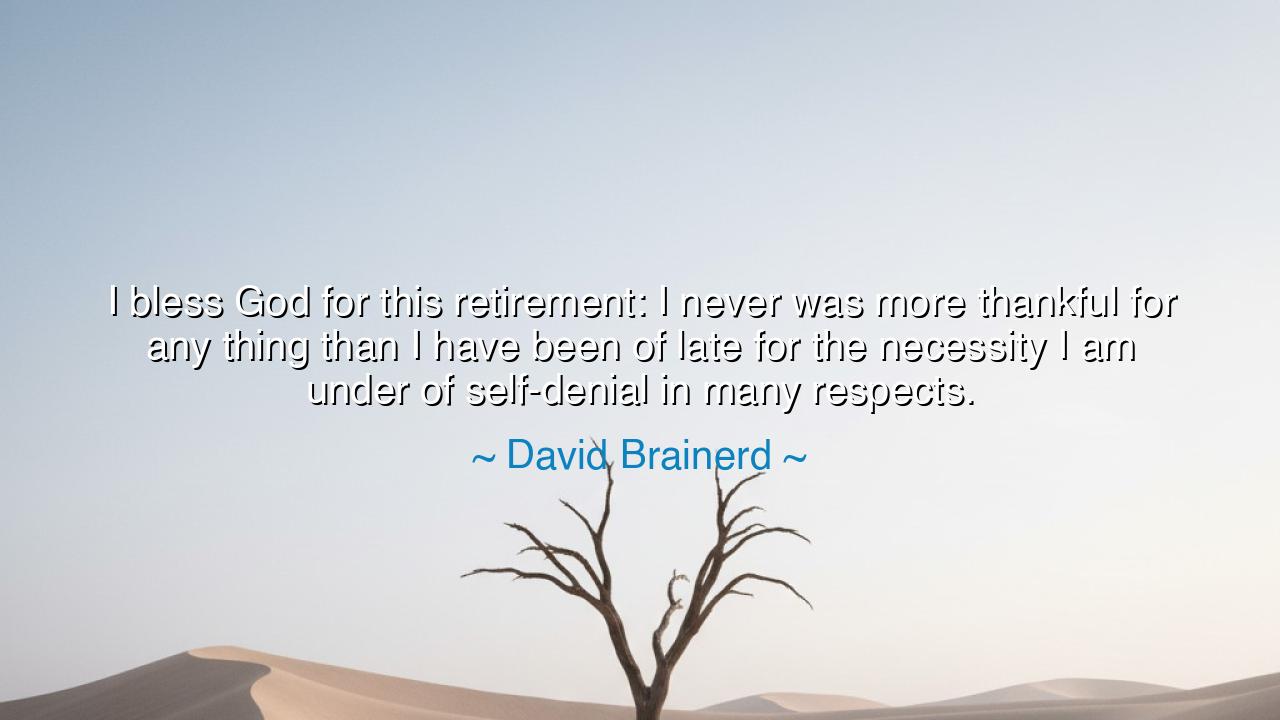
I bless God for this retirement: I never was more thankful for
I bless God for this retirement: I never was more thankful for any thing than I have been of late for the necessity I am under of self-denial in many respects.






David Brainerd, the missionary whose brief life was aflame with devotion, once wrote: “I bless God for this retirement: I never was more thankful for any thing than I have been of late for the necessity I am under of self-denial in many respects.” These words, drawn from his journals, are not the cry of a man weary of life, but the hymn of a soul that has discovered a deeper joy. For Brainerd found in retirement, in solitude, and in the discipline of self-denial, a closeness to God that the noise of the world could not provide. His gratitude was not for comfort but for sacrifice, not for indulgence but for restraint, for he saw that denial of self was the path to fullness of spirit.
The origin of these words rests in Brainerd’s circumstances. Sickly, frail, and often exiled to the wilderness, he was forced into a life that others might have called hardship. Yet instead of despairing, he transformed necessity into blessing. The very things that might have broken another man—poverty, loneliness, illness—he interpreted as mercies from God, opportunities to strip away earthly distractions and dwell nearer to the eternal. In this he echoes the wisdom of the ancients: that strength is perfected in weakness, and that to lose the world is often to gain the soul.
We may recall the example of the desert fathers of early Christianity. They fled the cities, relinquished possessions, and embraced lives of fasting and prayer, believing that self-denial cleansed the heart and made it a vessel fit for divine light. Antony of Egypt, for instance, gave up all wealth and retreated into the desert, where his struggles with temptation became the foundation of his sanctity. Brainerd, though far removed in time and place, walked a similar path. His thankfulness for self-denial places him among that lineage of saints who saw discipline not as burden but as liberation.
The lesson here is paradoxical: what seems like loss to the world can be gain to the soul. The necessity Brainerd spoke of—the enforced discipline of sickness and solitude—became the very instrument by which his faith was refined. Just as gold is purified in fire, so his character was strengthened by affliction. To be “thankful” for self-denial is to recognize that indulgence often weakens, while discipline fortifies. In this we hear the echoes of Stoic philosophers as well, who taught that contentment lies not in the abundance of possessions, but in mastering one’s desires.
History offers us many such testimonies. Consider Epictetus, the slave-turned-philosopher, who though deprived of freedom, proclaimed the greatness of inner liberty. His chains did not make him bitter; they taught him mastery of himself. Brainerd’s words carry the same essence: that when circumstances impose limits, the wise embrace them as opportunities for growth rather than curses. His gratitude is revolutionary—it turns suffering into blessing, necessity into gift, mortality into immortality.
The practical action for us is clear: do not despise the seasons of limitation in your life. When you are denied ease, when you are forced into sacrifice, when solitude or hardship finds you, seek the hidden blessing within it. Practice self-denial deliberately—not merely when compelled—to discover the strength and peace it brings. Fast from indulgence, step away from noise, cultivate discipline of heart and mind, and you will find treasures unseen by the world.
Thus, Brainerd’s words endure across centuries as a teaching: that to bless God for retirement and to be thankful for self-denial is to live with wisdom greater than comfort and joy deeper than pleasure. He teaches us that life’s harsh necessities can be transformed into mercies if we receive them with faith, and that the soul grows most radiant when stripped of all but the presence of the Eternal.






AAdministratorAdministrator
Welcome, honored guests. Please leave a comment, we will respond soon